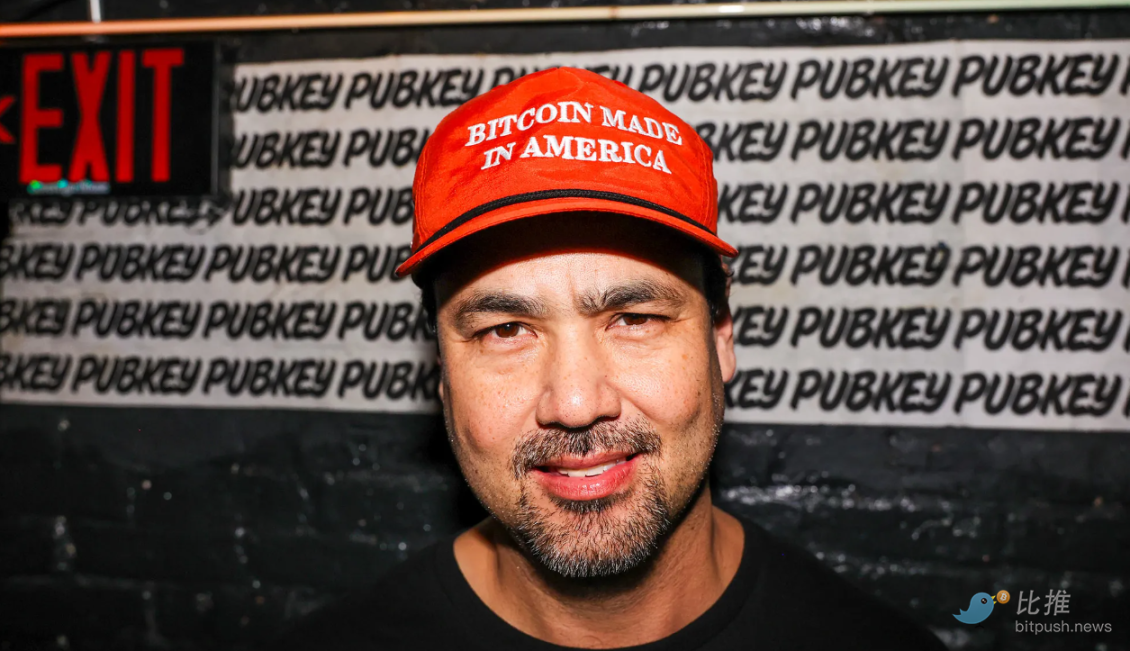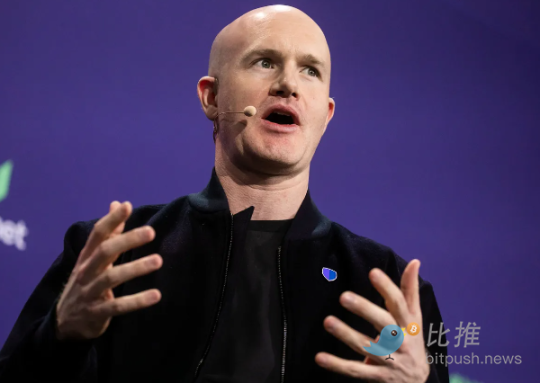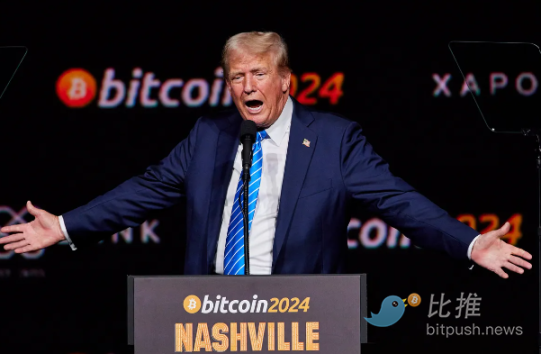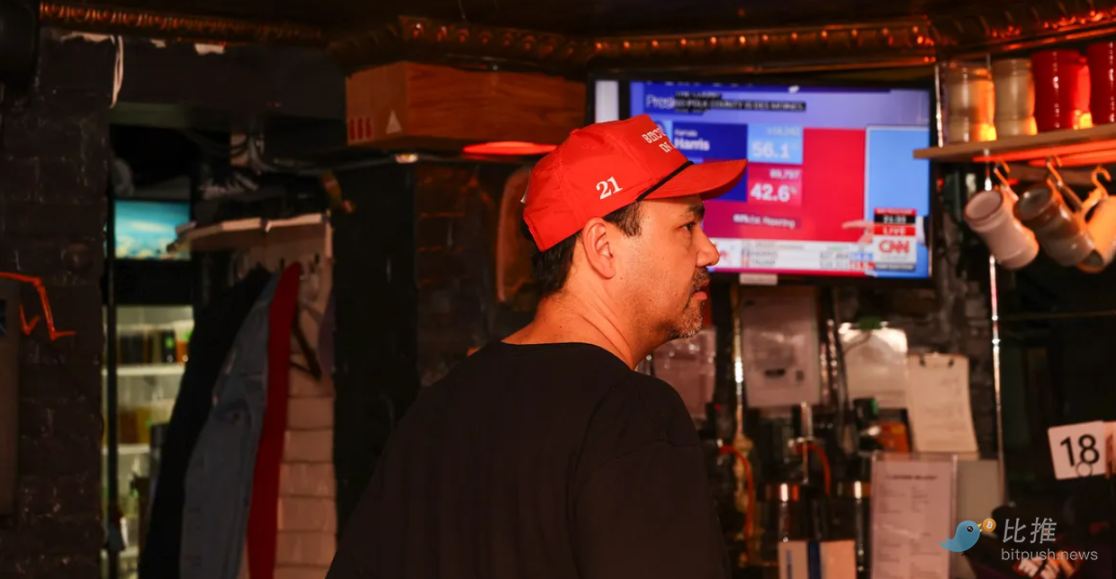In this era where corporate spending on cryptocurrency is almost unrestricted, it has almost become a flawless special interest group.
Written by: Zeke Faux
Translated by: BitpushNews Yanan
On November 5, dozens of Bitcoin enthusiasts, people wearing MAGA hats, and local residents gathered at PubKey, a Bitcoin-themed bar in Greenwich Village, New York, to follow the latest developments in the election. A digital screen on the bar's wall displayed the real-time price of Bitcoin, which surged past $73,000 when favorable news for Donald Trump broke.
Meanwhile, Ohio Republican Bernie Moreno was attempting to challenge Senator Sherrod Brown's seat, proposing a hearing on the issue of terrorists using cryptocurrency. Notably, Moreno's campaign received up to $40 million in funding from cryptocurrency companies.


Around 10:30 PM that night, an organizer of a Bitcoin meetup excitedly announced that, according to data from the crypto betting site Polymarket, the probability of Trump winning had risen to 88%. "Look, Bitcoin is skyrocketing!" he exclaimed, "You need to get in before it breaks the million-dollar mark!"
Just a year ago, such a scene seemed quite unbelievable. Regulators were ever-present, and token prices were still mired in a plunge that caused significant losses for investors. The former leader of the Bitcoin community, SBF, was facing legal judgment for fraud and was currently imprisoned. As for Trump's stance on Bitcoin, the only widely known statement was his assertion in 2021 in Fox Business magazine that Bitcoin was merely a "scam."
By September 2023, the reputation of the Bitcoin industry had plummeted, but at this critical juncture, Coinbase founder and billionaire Brian Armstrong quietly laid the groundwork to secure a place for cryptocurrency in Washington. Three months prior, Armstrong's company had been sued by the U.S. Securities and Exchange Commission (SEC), which insisted that most transactions conducted there over the years were illegal. This lawsuit, along with similar accusations against other industry giants, seemed to herald the impending doom of cryptocurrency in the U.S.
At a crypto discussion conference in New York, Armstrong shared his insights. He expressed optimism that the crypto industry could prompt the government to establish more favorable regulatory rules. He emphasized that the key was the power of money. To truly make their voices heard on the political stage, the crypto industry must significantly increase political donations, competing with Wall Street or the oil and gas industry, and invest at least $50 million annually. "We must face reality," Armstrong stated bluntly, "In this world, money does make many things possible."
He solemnly announced that Coinbase would extend a helping hand to a political action committee called Fairshake and warmly invited industry peers to join in. At this moment, Ryan Selkis, the former head of the crypto research firm Messari, also took the stage and candidly articulated the current situation: "We are being financially squeezed by the pipeline welders in Ohio." "The battle has begun, and we have no way to retreat because this is about our survival."
His call did not go unheeded. As the 2024 election cycle approached, Armstrong not only successfully reached his fundraising goals but exceeded everyone's expectations. Cryptocurrency companies generously donated to Fairshake and its partners, with total contributions surpassing $200 million, and Coinbase alone contributed $75 million, making it the leader in political donations within the crypto industry. Subsequently, Fairshake carefully allocated these funds to congressional candidates from both parties and proudly claimed to have helped eliminate House members Katie Porter and Jamaal Bowman in the Democratic primaries.

Although Fairshake did not engage in the presidential campaign, other wealthy figures in the crypto industry, particularly Gemini founders Winklevoss and Kraken exchange founder Jesse Powell, generously contributed at least $25 million to support Donald Trump. Trump quickly responded, actively embracing cryptocurrency. At the Bitcoin conference held in Nashville in July, he passionately announced his commitment to making the U.S. the "global center for cryptocurrency" and establishing a national strategic Bitcoin reserve. He vowed to remove SEC Chairman Gary Gensler and replace him with someone more friendly to cryptocurrency, stating, "If Bitcoin is destined to skyrocket and go to the moon," Trump declared boldly, "then America must be the leader."
An industry originally aimed at resisting government control now seems to entrust its future to politicians, which appears quite ironic. However, in the 15 years since Bitcoin's inception, the only widely accepted use of cryptocurrency has been trading on exchanges—in simple terms, betting real money on the price fluctuations of these digital assets. (In the recent resurgence of cryptocurrency, a meme coin called "dogwifhat" has emerged. This token, a parody of Dogecoin, features a small dog wearing a flat cap and has a market cap of about $2 billion.) These cryptocurrency trading platforms are incredibly profitable, while the SEC has been trying to regulate them and even impose penalties.

The details of the SEC's case are indeed quite technically complex, but if we draw a comparison to traditional gambling, the situation may become clearer. The commission tends to restrict gambling activities to a few racetracks and imposes strict drug testing on participating horses. In contrast, the cryptocurrency industry hopes for complete openness in this area, allowing people to stake their properties on live cockfighting matches in Nicaragua and even use their winnings to pay for a coffee at Starbucks.
Of course, supporters of cryptocurrency would not describe it this way. They prefer to tout cryptocurrency as "America's innovation" and widely promote how it will empower people with financial freedom. The political ads put out by the industry even make no mention of cryptocurrency. For example, a Fairshake ad supporting Moreno claims he will stop "illegal immigrants from taking Ohio's tax revenue."
As the election approaches, this cynical strategy of the cryptocurrency industry seems to be starting to pay off. Kamala Harris has begun to court the industry, although these overtures appear somewhat chaotic, such as her inexplicably including cryptocurrency regulation in her agenda to help Black people.
Trump has also personally stepped in to promote his own crypto project—World Liberty Financial. This idea was initially instilled in Trump's sons by a self-proclaimed "internet wealth guru." Although the crypto industry has concerns about Trump's token, several insiders within the party have revealed that this subtle connection of interests may actually make the former president more determined to push for favorable regulatory policies for cryptocurrency—provided he wins the election.

At PubKey on election night, two thirty-something salesmen wearing MAGA hats scrolled through trending topics on X while jokingly telling a reporter that once Trump was elected, the reporter would be among the first "lucky ones" to be "sent" out of the country. (As they left, they dramatically hid their hats in their backpacks.) Meanwhile, an elderly compliance officer wearing a vintage pin that read "We hope for Kennedy's return" expressed his concerns about the dollar's predicament. He harshly criticized the U.S. for using the banking system to freeze Russian assets after Putin invaded Ukraine, calling it a major mistake. He lamented, "If a currency can be arbitrarily declared invalid by its creator, then it fundamentally loses the value and meaning that currency should have."
Inside the bar, customers streamed in and were intently watching the live election results broadcasted by Bitcoin Magazine. Others were busy checking the latest odds on Polymarket. The bar owner clarified to me that PubKey is not exclusively a bar for Trump supporters, but almost everyone present admitted they voted for Trump. Interestingly, Trump himself visited this underground bar in September and generously paid for a pile of cheeseburgers with Bitcoin, although due to his lack of familiarity with the process, he had to hand his phone to a bar employee for assistance in completing the transaction.
A 33-year-old man wearing glasses confidently stated that the Bitcoin strategic reserve promised by Trump would surely trigger a global buying frenzy. "It's like the space race back in the day," he vividly compared, "Countries will spare no effort to hoard as much Bitcoin as possible."
Around 11:15 PM, David Bailey, CEO of Bitcoin Magazine, excitedly announced Trump's victory during the live broadcast. He was at Trump's watch party in West Palm Beach, Florida, wearing a red hat emblazoned with the slogan "Make Bitcoin Great Again." Bailey eagerly said, "Now we can put our grand vision for Bitcoin into practice. I eagerly look forward to the start of the orange president's term and the rise of the orange party (referring to the color representing Bitcoin, not Trump's ochre)."
Fairshake's lobbying efforts have achieved significant results. Its primary target—Ohio's Congressman Brown—lost his seat, resulting in the Senate falling under Republican control, which means that pro-cryptocurrency Republican Senator Tim Scott is likely to lead the Banking Committee. Fairshake and its affiliated groups have invested $135 million, and as of this Thursday, 47 of the 56 candidates they supported have successfully been elected. According to the nonprofit organization Public Citizen, since 2010, spending by the cryptocurrency industry has accounted for over 15% of all known corporate spending, second only to the oil and gas industry. Fairshake also stated that they have reserved $78 million for the 2026 midterm elections.

The core demands of the industry seem poised for a turnaround. Reports indicate that a leading candidate to replace Gensler as the chair of the U.S. Securities and Exchange Commission (SEC) is the chief legal counsel of a brokerage firm that holds a positive attitude toward cryptocurrency. Meanwhile, some congressional Democrats who were originally opposed to supporting legislation for the crypto industry have shown subtle changes in their stance.
Rohan Grey, a law professor at Willamette University, pointed out: "The massive investment in cryptocurrency in this election is undoubtedly a stern warning to the Democrats, reminding them not to easily provoke this fight. Because doing so would not benefit them."
In this era where corporate spending is almost unrestricted, cryptocurrency has almost become a flawless special interest group. To secure generous donations from the oil industry, politicians may have to push controversial pipeline projects or allow oil drilling in wildlife reserves despite strong public opposition. However, very few people stand up against cryptocurrency, as most remain confused about it.
At the PubKey gathering on election night, I met a 33-year-old product manager. He admitted that although he couldn't clearly explain how Bitcoin works, he had a favorable impression of it.
"I think this thing, no one can really explain it," his friend interjected, boasting that he had achieved nearly tenfold returns through investing in Bitcoin.
"Maybe it will become the digital gold standard of the future," the product manager said with anticipation.
But his friend was skeptical, countering, "That's actually just gambling."
免责声明:本文章仅代表作者个人观点,不代表本平台的立场和观点。本文章仅供信息分享,不构成对任何人的任何投资建议。用户与作者之间的任何争议,与本平台无关。如网页中刊载的文章或图片涉及侵权,请提供相关的权利证明和身份证明发送邮件到support@aicoin.com,本平台相关工作人员将会进行核查。




